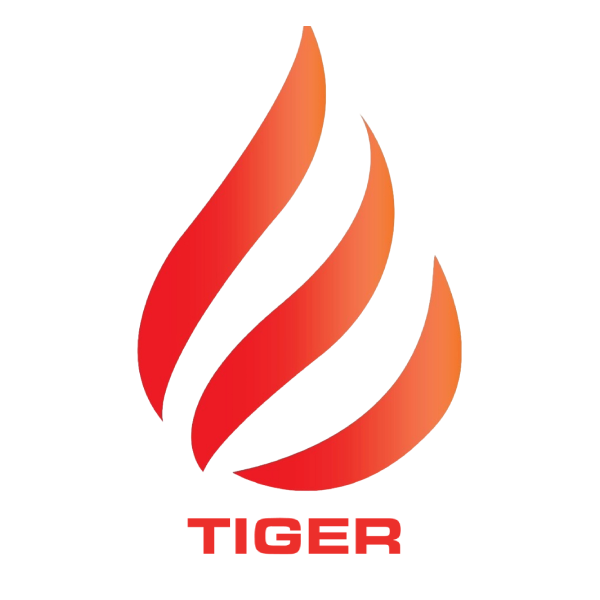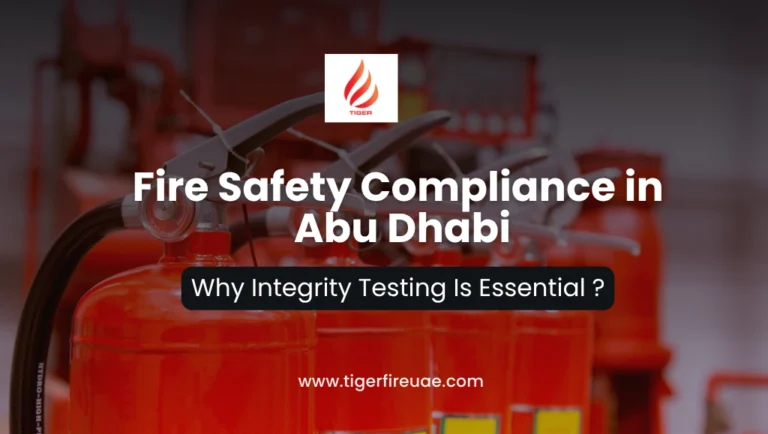Introduction
Suppression System Integrity Testing is not just a regulatory checkbox—it’s a vital safeguard for life, property, and brand reputation in Abu Dhabi. As Commercial and industrial buildings grow taller and smarter, fire suppression systems are playing increasingly critical roles. Ensuring their integrity is fundamental to meeting UAE Civil Defence regulations, protecting occupants, and minimizing financial risk. This blog will explore the importance of suppression system testing, legal obligations, common pitfalls, and how Tiger Fire’s professional approach delivers peace of mind.
1. Understanding Suppression System Integrity Testing
Suppression system integrity testing, also called hydrostatic or pressure testing, systematically evaluates the strength and leak-tightness of fire suppression components—pipes, valves, fittings, and cylinders. By simulating realistic operating pressures, the tests ensure that systems like deluge valves, CO₂ cabinets, FM‑200, and foam networks will perform under emergency conditions—without failure.
Why it matters:
- Detects unseen corrosion, pinhole leaks, valve malfunctions
- Prevents system failure during actual fires
- Extends service lifespan through early maintenance
2. Legal Mandate: Civil Defence & NFPA Standards
Abu Dhabi operates under the UAE Fire and Life Safety Code (2018), closely aligned with NFPA 25 standards. Per Civil Defence regulations, major suppression systems require:
- Annual integrity testing
- Third-party inspection reports
- Immediate repair of identified defects
Failing to comply can halt operations, result in heavy fines, or block certificates of occupancy. For industries like hospitality, retail, warehousing, or mixed-use developments, compliant fire suppression is essential from day one.
3. Real-World Consequences of Neglect
Neglecting integrity testing can result in catastrophic outcomes:
- A faulty CO₂ suppression valve in a Dubai warehouse failed, leading to delayed fire control and extensive inventory loss.
- A hotel in Abu Dhabi faced a week-long shutdown and AED 200,000 in fines when Civil Defence found untested deluge valves during inspection.
Conversely, companies that perform regular suppression system testing demonstrate superior due diligence—reducing liability risk and enhancing stakeholder trust.
4. The Impact on Risk & Insurance
Insurance companies factor suppression testing into risk assessment:
- Companies maintaining certificates from accredited firms (like Tiger Fire) can reduce premiums
- Insurers may refuse coverage or cash payouts if system failures are traced to missed or faulty testing
Proactive testing not only ensures safety—it delivers tangible financial benefits.
5. Tiger Fire’s Comprehensive Testing Services
At Tiger Fire UAE, every suppression system undergoes a rigorous testing process:
- Pre-Inspection & Decommissioning
- Inspect pipes and pressurize systems per NFPA 12/13 standards
- Inspect pipes and pressurize systems per NFPA 12/13 standards
- Hydrostatic Testing
- Pressure testing up to 1.5× operating pressure for set durations
- Pressure testing up to 1.5× operating pressure for set durations
- Leak Detection & Repair
- Identify leaks during depressurization; repair or replace faulty components
- Identify leaks during depressurization; repair or replace faulty components
- Certification & Documenting
- Provide formal inspection reports for Civil Defence compliance
- Provide formal inspection reports for Civil Defence compliance
- Preventive Maintenance Guidance
- Log results; recommend schedule for future inspections and part replacements
- Log results; recommend schedule for future inspections and part replacements
Our technicians are Civil Defence approved, ensuring audits and certificates are seamlessly accepted.
6. When & How Often to Test
Per NFPA 25 and UAE Codes:
- Annual: Full integrity testing of suppression systems
- Semi-Annual: Visual inspections
- Monthly: Pressure gauge checks and alarm testing
Buildings with increased risk (data centers, chemical warehouses) may require more frequent or automated integrity verification.
7. Upgrades, Retrofits, & Legal Compliance
Suppression systems older than 10 years often require:
- Retrofitting with modern valves and monitoring
- Updating piping to current standards
- Consulting Tiger Fire for legal compliance alignments and revision planning
Experts help convert existing infrastructure while maintaining uninterrupted fire system readiness.
8. How to Choose a Qualified Testing Partner
Look for:
- Civil Defence accreditation
- NFPA-trained technicians
- On-site pressure testing capability
- Complete documentation for audits
- Quick-responsive maintenance teams
Tiger Fire exceeds these criteria—trusted by Abu Dhabi’s top properties and institutions.
9. What Building Owners Should Do
- Schedule annual integrity tests early in the year
- Store documentation in a centralized compliance file
- Use testing as a springboard for broader fire safety audit
- Train staff on system basics and emergency response
Proactive action positions you ahead of Fire Code requirements and ensures safety-first operations.
Conclusion
Fire suppression systems must be more than installed; they must be proven under pressure. Suppression System Integrity Testing by Tiger Fire UAE ensures your systems meet their legal obligations, perform reliably, and deliver true protection.

